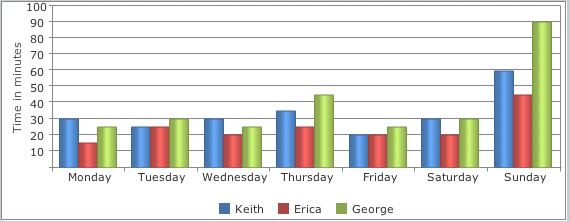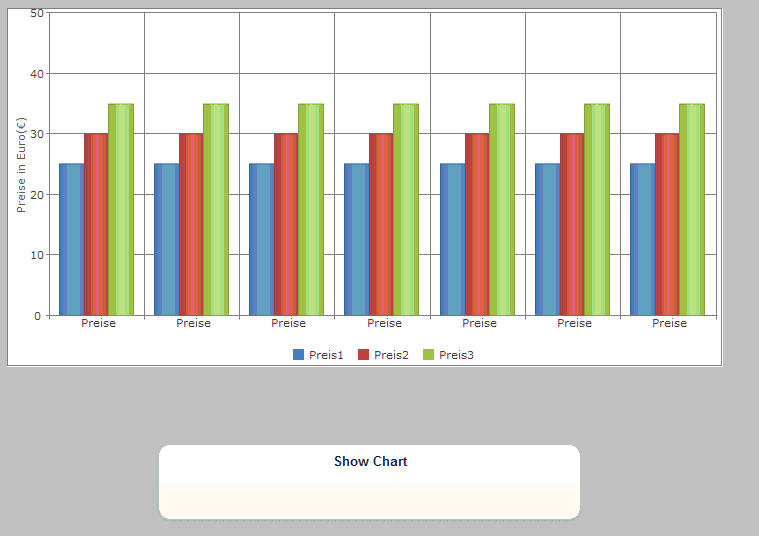|
|
| (22 intermediate revisions by 2 users not shown) |
| Line 3: |
Line 3: |
| == Description == | | == Description == |
| jqxChart is an easy to use chart widget based on the popular jQuery library. | | jqxChart is an easy to use chart widget based on the popular jQuery library. |
| | |
| | jqWidgets is a commercial product, which depending on how you use it, requires a license fee. Complete details are on jqWidget's website. The product is well supported. |
| | |
| | jqxChart supports several common chart types. You can easily plot series of different types on a common chart. A type must be specified for each series group. Currently jqxChart supports the following series types: |
| | |
| | * column - simple column series |
| | * stackedcolumn - stacked column series |
| | * stackedcolumn100 - percentage stacked columns |
| | * line - simple streight lines connecting the value points |
| | * stackedline - stacked lines |
| | * stackedline100 - percentage stacked lines |
| | * spline - smooth lines connecting the value points |
| | * stackedspline - smooth stacked lines |
| | * stackedspline100 - percentage stacked smooth lines |
| | * area - area connecting the value points with streight lines |
| | * stackedarea- stacked area with streight lines between the points |
| | * stackedline100 - percentage stacked area |
| | * areaspline - smooth area connecting the value points |
| | * stackedareaspline - smooth stacked areas |
| | * stackedareaspline100 - percentage stacked smooth area |
| | * pie - circular chart divided into sectors, illustrating proportion |
| | * scatter - data is displayed as a collection of points |
| | * bubble - data is displayed as a collection of bubbles |
|
| |
|
| == Properties and Methods == | | == Properties and Methods == |
|
| |
|
| See the complete documentation at jqWidget's site:
| | This control is well documented on the jqWidget's website: http://www.jqwidgets.com/jquery-widgets-documentation/. |
| http://www.jqwidgets.com/jquery-widgets-documentation/documentation/jqxgrid/jquery-grid-getting-started.htm | |
|
| |
|
| == Example == | | == Example == |
| | |
| | <tabber> |
| | JavaScript= |
| | <syntaxhighlight lang="JavaScript"> |
| | function Button1_onclick() { |
| | //Render the chart. |
| | $("#Chart2").jqxChart(Chart2_settings); |
| | } |
| | |
| | var sampleData = [ |
| | { Day:'Monday', Keith:30, Erica:15, George: 25}, |
| | { Day:'Tuesday', Keith:25, Erica:25, George: 30}, |
| | { Day:'Wednesday', Keith:30, Erica:20, George: 25}, |
| | { Day:'Thursday', Keith:35, Erica:25, George: 45}, |
| | { Day:'Friday', Keith:20, Erica:20, George: 25}, |
| | { Day:'Saturday', Keith:30, Erica:20, George: 30}, |
| | { Day:'Sunday', Keith:60, Erica:45, George: 90} |
| | ]; |
| | |
| | Chart2_settings.source = sampleData; |
| | Chart2_settings.categoryAxis = { |
| | dataField: 'Day', |
| | showGridLines: false}; |
| | Chart2_settings.seriesGroups = |
| | [ |
| | { |
| | type: 'column', |
| | columnsGapPercent: 30, |
| | seriesGapPercent: 0, |
| | valueAxis: |
| | { |
| | minValue: 0, |
| | maxValue: 100, |
| | unitInterval: 10, |
| | description: 'Time in minutes' |
| | }, |
| | series: [ |
| | { dataField: 'Keith', displayText: 'Keith'}, |
| | { dataField: 'Erica', displayText: 'Erica'}, |
| | { dataField: 'George', displayText: 'George'} |
| | ] |
| | } |
| | ] |
| | </syntaxhighlight> |
| | |-| |
| | BASIC= |
| | <syntaxhighlight lang="vb.net"> |
| | Dim sampleData, row |
| | |
| | Function Button1_onclick() |
| | 'Render the chart. |
| | $("#Chart1").jqxChart(Chart1_settings) |
| | End Function |
| | |
| | Function Form1_onshow() |
| | sampleData = [] |
| | For i=0 To 6 |
| | row=[] |
| | row["id"] = "Preise" |
| | row["Preis1"] = 25 |
| | row["Preis2"] = 30 |
| | row["Preis3"] = 35 |
| | sampleData[i]= row |
| | Next |
| | |
| | Chart1_settings.source = sampleData |
| | Chart1_settings.categoryAxis={dataField:"id", showGridLines:True} |
| | Chart1_settings.seriesGroups = [ _ |
| | { _ |
| | type: "column", _ |
| | columnsGapPercent: 30, _ |
| | seriesGapPercent: 0, _ |
| | valueAxis: _ |
| | { _ |
| | minValue: 0, _ |
| | maxValue: 50, _ |
| | unitInterval: 10, _ |
| | description: "Preise in Euro(€)" _ |
| | }, _ |
| | series:[ _ |
| | { dataField: "Preis1", displayText: "Preis1"}, _ |
| | { dataField: "Preis2", displayText: "Preis2"}, _ |
| | { dataField: "Preis3", displayText: "Preis3"} _ |
| | ] _ |
| | } _ |
| | ] |
| | |
| | End Function |
| | </syntaxhighlight> |
| | </tabber> |
| | |
| | |
| | |
| | To resize a chart: |
|
| |
|
| <pre> | | <pre> |
| Dim data, source, dataAdapter
| | Chart1.resize(100,100,600,400) |
| data = generatedata(50) 'generatedata is a function which returns grid data
| | $("#Chart1").jqxChart("refresh") |
| source = {localdata: data, datatype: "array"}
| | </pre> |
| dataAdapter = new $.jqx.dataAdapter(source)
| | <pre> |
|
| | Function Form1_onresize() |
| Grid1_settings.source = dataAdapter
| | $("#Chart2").jqxChart("refresh") |
| Grid1_settings.columns = [ _
| | End Function |
| { text: "First Name", dataField: "firstname", width: 100 }, _
| |
| { text: "Last Name", dataField: "lastname", width: 100 }, _
| |
| { text: "Product", dataField: "productname", width: 180 }, _
| |
| { text: "Quantity", dataField: "quantity", width: 80, cellsalign: "right" }, _
| |
| { text: "Unit Price", dataField: "price", width: 90, cellsalign: "right", cellsformat: "c2" }, _
| |
| { text: "Total", dataField: "total", cellsalign: "right", minwidth: 100, cellsformat: "c2" } _
| |
| ]
| |
| </pre> | | </pre> |
|
| |
|
| == Output == | | == Output == |
| | [[File:Chart with pur basic.png]] |
| | |
| | [[Category:Language Reference]] |
| | |
| | [[Category:jqWidgets]] |
|
| |
|
| See above.
| | [[Category:Controls]] |

Description
jqxChart is an easy to use chart widget based on the popular jQuery library.
jqWidgets is a commercial product, which depending on how you use it, requires a license fee. Complete details are on jqWidget's website. The product is well supported.
jqxChart supports several common chart types. You can easily plot series of different types on a common chart. A type must be specified for each series group. Currently jqxChart supports the following series types:
- column - simple column series
- stackedcolumn - stacked column series
- stackedcolumn100 - percentage stacked columns
- line - simple streight lines connecting the value points
- stackedline - stacked lines
- stackedline100 - percentage stacked lines
- spline - smooth lines connecting the value points
- stackedspline - smooth stacked lines
- stackedspline100 - percentage stacked smooth lines
- area - area connecting the value points with streight lines
- stackedarea- stacked area with streight lines between the points
- stackedline100 - percentage stacked area
- areaspline - smooth area connecting the value points
- stackedareaspline - smooth stacked areas
- stackedareaspline100 - percentage stacked smooth area
- pie - circular chart divided into sectors, illustrating proportion
- scatter - data is displayed as a collection of points
- bubble - data is displayed as a collection of bubbles
Properties and Methods
This control is well documented on the jqWidget's website: http://www.jqwidgets.com/jquery-widgets-documentation/.
Example
function Button1_onclick() {
//Render the chart.
$("#Chart2").jqxChart(Chart2_settings);
}
var sampleData = [
{ Day:'Monday', Keith:30, Erica:15, George: 25},
{ Day:'Tuesday', Keith:25, Erica:25, George: 30},
{ Day:'Wednesday', Keith:30, Erica:20, George: 25},
{ Day:'Thursday', Keith:35, Erica:25, George: 45},
{ Day:'Friday', Keith:20, Erica:20, George: 25},
{ Day:'Saturday', Keith:30, Erica:20, George: 30},
{ Day:'Sunday', Keith:60, Erica:45, George: 90}
];
Chart2_settings.source = sampleData;
Chart2_settings.categoryAxis = {
dataField: 'Day',
showGridLines: false};
Chart2_settings.seriesGroups =
[
{
type: 'column',
columnsGapPercent: 30,
seriesGapPercent: 0,
valueAxis:
{
minValue: 0,
maxValue: 100,
unitInterval: 10,
description: 'Time in minutes'
},
series: [
{ dataField: 'Keith', displayText: 'Keith'},
{ dataField: 'Erica', displayText: 'Erica'},
{ dataField: 'George', displayText: 'George'}
]
}
]
Dim sampleData, row
Function Button1_onclick()
'Render the chart.
$("#Chart1").jqxChart(Chart1_settings)
End Function
Function Form1_onshow()
sampleData = []
For i=0 To 6
row=[]
row["id"] = "Preise"
row["Preis1"] = 25
row["Preis2"] = 30
row["Preis3"] = 35
sampleData[i]= row
Next
Chart1_settings.source = sampleData
Chart1_settings.categoryAxis={dataField:"id", showGridLines:True}
Chart1_settings.seriesGroups = [ _
{ _
type: "column", _
columnsGapPercent: 30, _
seriesGapPercent: 0, _
valueAxis: _
{ _
minValue: 0, _
maxValue: 50, _
unitInterval: 10, _
description: "Preise in Euro(€)" _
}, _
series:[ _
{ dataField: "Preis1", displayText: "Preis1"}, _
{ dataField: "Preis2", displayText: "Preis2"}, _
{ dataField: "Preis3", displayText: "Preis3"} _
] _
} _
]
End Function
To resize a chart:
Chart1.resize(100,100,600,400)
$("#Chart1").jqxChart("refresh")
Function Form1_onresize()
$("#Chart2").jqxChart("refresh")
End Function
Output


